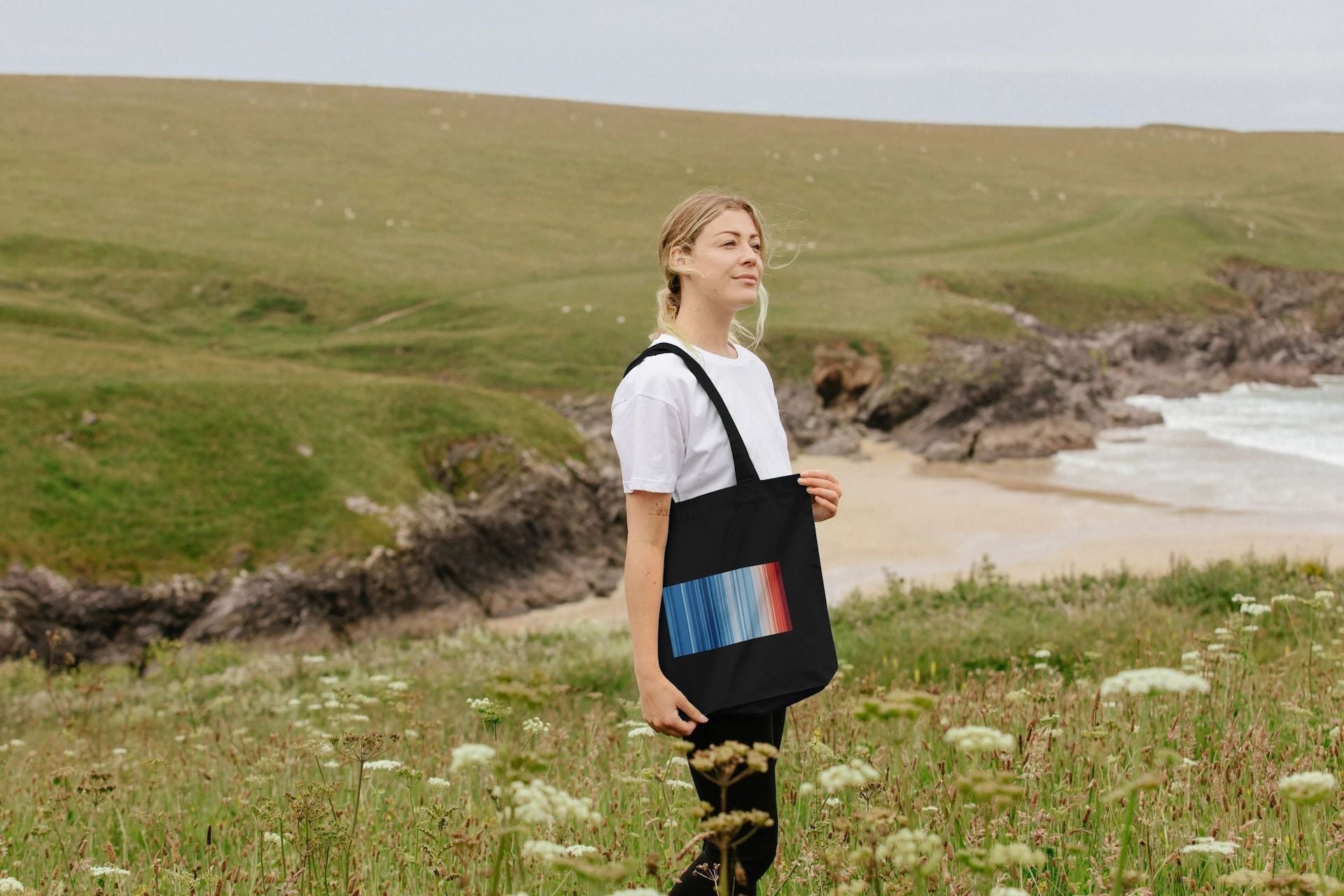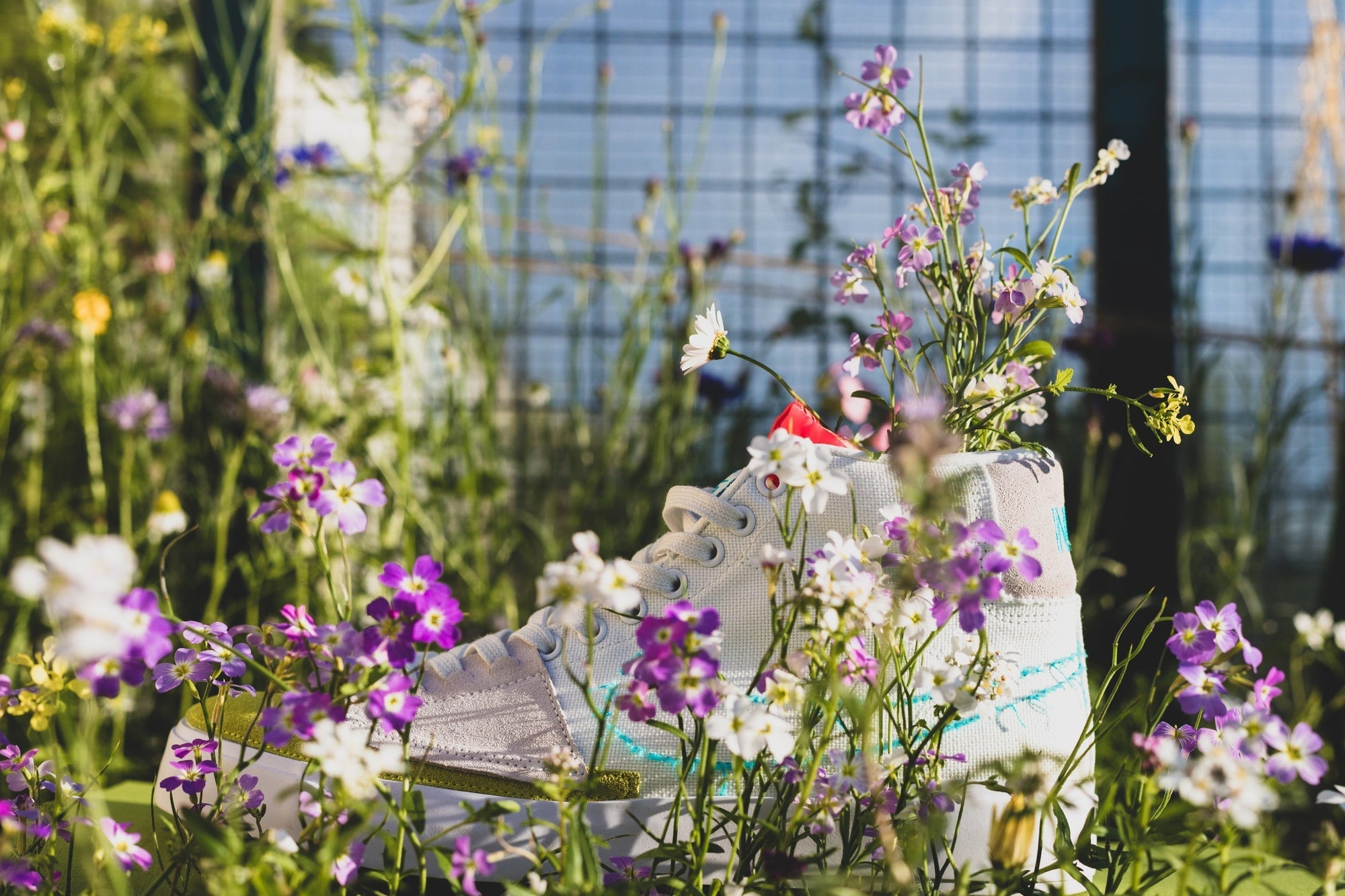Here’s a round-up of some of the finest sustainable fashion stories that hit the news in May…

Vegan recycled trainers
One of the best bits about this job is getting to research the world of sustainable fashion and find out what’s new. Reading about people seeking to reduce waste by recycling everyday materials into new objects to use or wear is very motivating! This time around it is recycled aluminium foil that is being used in trainers!
German footwear brand Nat-2 is known for using unusual, natural materials for shoes, such as coffee grounds, mushrooms, cannabis, leaves and many others! Aluminium foil is very different of course, but Nat-2 has found a way by working with an Israeli start-up known for innovative textiles, Remnant. The outcome is the vegan, unisex Nat-2 “Sleek Alchemist” sneaker that is made up of upcycled aluminium foil, reflective glass, bioceramic, cork and rubber.
As you might imagine, the trainers are partly reflective and betray a certain futuristic space-age chic suited to those that prefer simple, tangible fashion (rather than the kaleidoscopic variety found in the metaverse).
Blockchain for good
That last reference to the metaverse was not meant to be disparaging. It would be easy to follow the herd and think that all of the crypto hullabaloo is one giant scam, however compelling the evidence. Such a simplification would be a great disservice to those that care about Mother Earth and happen to think that blockchain is a nifty bit of technology; a not insignificant part of the population, especially if the millennial and zoomer crypto bros get richer and choose to fund regenerative endeavours.
One of the long-touted benefits of blockchain technology has been its supposed ability to bring greater transparency to supply chains. The origin of the raw materials in one’s clothes and the journey that they go on as they get worn and hopefully recycled into new clothes is a complex set of data that can be captured on the blockchain. Dutch company, Waste2Wear, has developed award-winning technology that gives insight into the circular journey of plastic waste, so that steps along the way are traceable, measurable and verifiable. It does this by giving each recycled raw material stickers and locks with a unique QR and barcode on them, which are updated with new information with each scan. This new information includes details on the person and organisation involved in each step as well as the geolocation and a photo.
As CEO, Monique Maissan, says in the interview: “It not only assures you that you are making things from recycled plastic, but also that your supply chain is fully compliant. It is also a good check on social compliance.”
Slow Fashion Declaration
Mayors from thirty global cities (as varied as Paris, Leuven, Rzeszów, Terrassa and Turku) signed the Slow Fashion Declaration which is designed to encourage key decision-makers to establish regulation countering fast fashion. The Slow Fashion Declaration is very ambitious as it seeks to wield international influence in accordance with targets set by the European Union, G7 and the Organisation for Economic Co-operation and Development.
The objectives are to level the playing field between those working in fast fashion and slow fashion. The Declaration seeks to do this by raising public awareness of the consequences of fast fashion; facilitating access to production and sales sites for slow fashion actors by building public support for lower rents; encouraging financial backing for research into more environmentally friendly technical solutions, etc.
There are a great number of specific policy elements within the Declaration but what caught our eye was the desire to establish a European Slow Fashion label to inform people about the origin and environmental impact of clothing. We covered the concept of detailed carbon labelling in our sustainable fashion trends to look out for in 2023 article.
Crocs delays net-zero targets
If there’s anything as fickle as human relationships, it’s fashion’s commitment to climate change targets. Crocs, the footwear brand known for its questionably-stylish rubber shoes, is one of the latest fashion companies to push back their net-zero target.
By how long exactly? From 2030 to 2040: a whopping 10 years.
Crocs says the decision to revise the timeline was mainly due to the acquisition of HEYDUDE, made in December 2021. This announcement came after the US-based company released its latest 2022 ESG report, which featured a 45% increase in total emissions year-on-year. When the 2030 goal was first set, HEYDUDE was not yet part of the equation. Somehow, neither was a comprehensive baseline calculation of Crocs’ greenhouse gas emissions.
Not only that, Crocs also has lofty ambitions to achieve a 50% bio-based material composition by 2030, including 20% by 2023. As of last year, this number was only at 2.2%.
The numbers don’t quite wash. But are they greenwashing? If not, the line seems perilously close to being crossed.
A €10 million project hopes to remove barriers to a circular textile industry
The EU and its 27 partners have a new project. But perhaps ‘new’ isn’t the operative word.
Cisutac stands for Circular and Sustainable Textile and Clothing. It’s a four-year initiative focused on increasing reuse, repair, and recycling capacities for discarded clothes within the region - plus their affordability.
The goal is to remove current challenges to circularity and to develop new industry-wide value chains.
Belgian research centre Centexbel leads the project. Partner associations and organisations include big names like sporting goods store Decathlon, fibre manufacturer Lenzing, and fashion behemoths Inditex and PVH.
Early results for the pilot projects are supposed to come later this year, before moving on to the next stage of larger-scale prototypes. It’ll take some time because Cisutac’s mission is long term, developments are not expected to be adopted by the industry before 2025.
Unlike the failed endeavours of the past, Cisutac is notably different in terms of funding, and the scale and variety of its partnerships.
Bio-based leather from shrimp
The fashion industry is riding a R&D wave of materials development at the moment.
TômTex, a Brooklyn-based materials company, is developing a new leather alternative to cowhide. The fabric’s main material is made from shrimp. No, not from the meat, but instead from a sugar found in the shell: chitin. Engineer Nicole Sved explains the reasoning behind this sourcing decision. Shells are “a major waste stream from the shellfish industry, but it is in everything, including mushrooms, coffee and insects.”
Converting chitin still involves a chemical process, though one that’s supposedly not dangerous. Not only that, the dyes that are used are natural.
One might ask, “what about faux leathers like apple leather and grape leather? What makes shrimp leather a better option?” Well, for the former, and plenty of other leather alternatives, plastic still needs to be added. On the other hand, TômTex works with three principles in mind: no petroleum, no plastics, no toxins. A noble triptych.
So that was May. We hope that was enlightening and a little uplifting. We’ll be back in July - with another selection of June’s key sustainable fashion moments.






